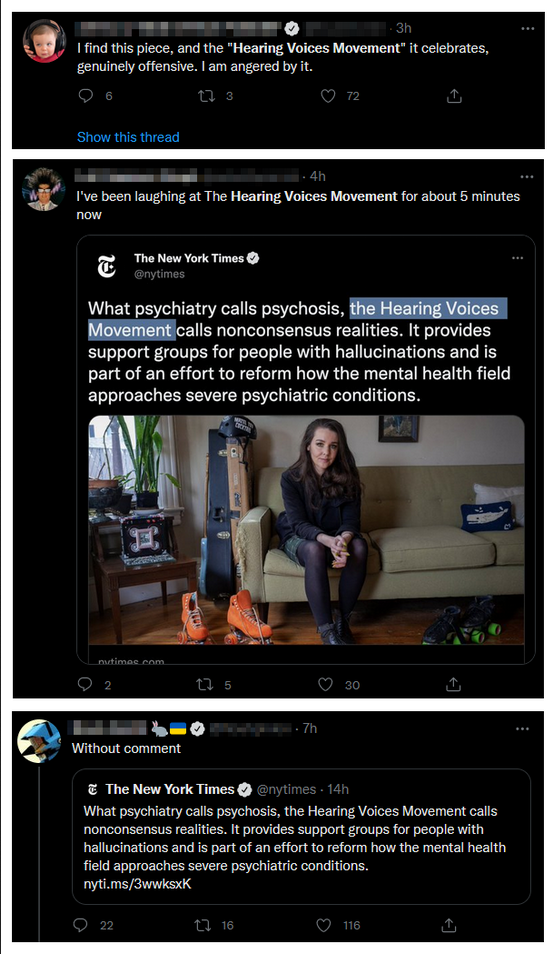Here’s a surprising report: President Trump’s support is actually rising after his attack on “The Squad”.
The rise in support isn’t the surprising part. The surprising part is that the Media still find this surprising.
Not to toot my own horn too much here, but I’ve been writing about this since 2015 … “Make America Great Again” was the Trump campaign’s official slogan, but unofficially — and much, much more effectively — it was: “Fuck the Media”. The 2016 election is known far and wide as “The Great Fuck You”, but somehow, some way, almost everyone still fails to grasp that it wasn’t the Democrats who got told to fuck off. It wasn’t even the “Progressives”. It was The Media. The Great Fuck You was aimed entirely at the Media.
Severian, “Which Hand Holds the Whip?”, Rotten Chestnuts, 2019-07-17.
August 14, 2022
QotD: The 2016 US election was a rejection of the media
July 23, 2022
QotD: “The New Journalism” and “narrative journalism”
Most of what we consider public life in modern societies is public reactions to things done by the powerful. The New York Times makes up a new hoax and the week is spent on the hoax. The usual suspects swear by the obvious lies and normal people spend days picking apart the lies. Occasionally, we get the reverse where some uncomfortable truth gets loose and the usual suspect go bananas trying to “debunk” it while normal people cling to it as blessed relief.
This is the news cycle in a nutshell. There is very little news. It has been at least a generation since the major news outlets in America have done reporting. Most of it is just stenography. The “journalist” copies what a government spokesbot has sent to them and dresses it up with some commentary. Then there are the narratives that are designed to give the public a way to repeat the official truth that sounds convincing to them and their acquaintances.
The source of this is the “new journalism” that emerged in the 1960’s. The late British reporter Chris Munnion chronicled this in his book Banana Sunday. He spent most of his life covering Africa for the Telegraph. In the 1960’s he noticed Americans showing up with pre-written narratives. They would seek out quotes and pictures to fill out the story they had prepared for the trip. Even if the facts contradicted the narrative, they stuck with the narrative because that was the new journalism.
Narrative journalism is just accepted these days. The “news” has always been a form of passive-aggressive political activism so its evolution into story telling on behalf of powerful interests seems natural. When you think of the New York Times, Washington Post and Wall Street Journal as propaganda arms of their respective clients in the managerial elite, it all makes sense. Instead of the Ministry of Truth we have the mainstream media “speaking truth to power”.
That last bit gets mocked by normal people on this side of the great divide because they have woken up to the reality of this age. As if often the case, however, there is a kernel of truth locked in this media fabrication. The people inside these disinformation operations genuinely fear the public. When they say “speak truth to power” they mean broadcast their truth to you in the hopes that you will buy it. Modern mass media is mostly a defensive weapon of the elites.
The Z Man, “The Lying Liars”, The Z Blog, 2022-04-20.
July 20, 2022
Book Review: The Wipers Times
Forgotten Weapons
Published 6 May 2018Get your copy here: https://amzn.to/2jzWnkI
Or here: https://amzn.to/2JOpMm3The Wipers Times was a satirical trench newspaper printed from February 1916 until December 1918 by British Captain F.J. Roberts and a crew of assistants. Such papers were not particularly uncommon, but the Wipers Times was particularly successful, well written, and long-lived, and it has survived in reprints today to a greater extent than any other similar work. A total of 23 issues were printed, and they consist of poetry, commentary, mock advertisements, advice columns, and short stories. While much of the humor is still quite accessible to us today, much of it also includes references, abbreviations, and inside jokes that are inscrutable to those who are not quite knowledgeable about life in the trenches.
Roberts and his cohorts were legitimate front-line soldiers, not writing as visiting journalists or from the safety of the rear echelons. Beyond its basic entertainment value, their writings also provide a rare and interesting view into the minds of men who were truly living the Great War.
Note that a book about the newspaper has also been printed, titled The Wipers Times, and with a very similar cover. If you want to buy a copy of the reprinted original issues, make sure you are not buying that book.
The BBC made a 90 minute program based on the Times, which is available in its entirely on YouTube here:
https://www.youtube.com/watch?v=SKPXu…[The original channel has been deleted, but I believe this is the same video: https://www.youtube.com/watch?v=juZBxhUYRpg]
(more…)
July 13, 2022
Joe Biden’s age and health can suddenly be discussed in the New York Times
In the free-to-cheapskates portion of Matt Taibbi’s TK News article on “The New Kremlinology”, he discusses the sudden change of policy for the New York Times regarding Joe Biden’s physical and cognitive condition:

After reading his formal remarks from the teleprompter, Joe Biden walks away from reporters without answering questions, August 2021.
On Monday, the New York Times ran a story pegged to a new poll, showing Joe Biden dragging a sub-Trumpish 33% approval rating into the midterms. The language was grave:
Widespread concerns about the economy and inflation have helped turn the national mood decidedly dark, both on Mr. Biden and the trajectory of the nation… a pervasive sense of pessimism that spans every corner of the country …
The article followed another from the weekend, “At 79, Biden Is Testing the Boundaries of Age and the Presidency”. That piece, about Biden’s age — code for “cognitive decline” — was full of doom as well:
Mr. Biden looks older than just a few years ago, a political liability that cannot be solved by traditional White House stratagems like staff shake-ups … Some aides quietly watch out for him. He often shuffles when he walks, and aides worry he will trip on a wire. He stumbles over words during public events, and they hold their breath to see if he makes it to the end without a gaffe.
Biden’s descent was obvious six years ago. Following the candidate in places like Nevada, Iowa, and New Hampshire, I listened to traveling press joke about his general lack of awareness and discuss new precautions his aides seemed to be taking to prevent him engaging audience members at events. Biden at the time was earning negative headlines for doing things like jamming a forefinger into the sternum of a black activist named Tracye Redd in Waterloo, Iowa, one of several such incidents just on that trip.
My former editor at Rolling Stone John Hendrickson, a genial, patient person whom I like a great deal, insisted from afar that Biden’s problems were due to continuing difficulties with a childhood stutter, something John had also overcome. He went on to write a piece for the Atlantic called “Joe Biden’s Stutter, and Mine” that became a viral phenomenon, abetting a common explanation for Biden’s stump behavior: he was dealing with a disability. The Times added op-eds from heroes like airline pilot Captain “Sully” Sullenberger with titles like, “Like Joe Biden, I Once Stuttered, Too. I Dare You to Mock Me”.
But I’d covered a much sharper Biden in 2008 and felt that even if the drain of overcoming a stutter had some effect, the problems were cognitive, not speech-related. He struggled to remember where he was and veered constantly into inappropriateness, challenging people physically, telling crazy-ass stories, and angering instantly. He’d move to inch-close face range of undecideds like Cedar Rapids resident Jaimee Warbasse and grab her hand (“we’re talking minutes”, she said) before saying, “If I haven’t swayed you today, then I can’t.” I called the mental health professionals who were all too happy to diagnose Donald Trump from afar for a story about the effort to remove Trump under the 25th amendment, and all declined to discuss Biden even off the record for “ethical” reasons.
This week, all that changed. Add stories like “Biden Promised to Stay Above the Fray, but Democrats Want a Fighter” and Michelle Goldberg’s “Joe Biden is Too Old to Be President Again”, and what we’ve got is a newspaper that catches real history spasmodically and often years late, but has the accuracy of an atomic clock when it comes to recording the shifting attitudes of elite opinion.
July 3, 2022
QotD: The US media when Donald Trump “happened”
[The 2008 election was] where the split between Party and Media really became obvious — the Party desperately wanted the only “adult” (by 21st century Democratic Party standards) in the room to be the nominee, but The Media wouldn’t hear of it. It seemed as though the struggle for the whip hand was finally over …
But then Donald Trump happened, as my students would’ve written. Though it’s only a few years in the past, we’ve already forgotten just how much The Media loved Bernie Sanders when the Republican nomination was still in doubt. Trump, of course, made The Media lose their shit so egregiously that what they did to W. looked like the happy ending to an Oriental massage, but virtually nobody was cheerleading for Hillary qua Hillary. It took the specter of The Donald as president to get them all on the same page.
Which brings us to now. The Democratic Party can read a poli-sci textbook. They know how difficult it is to beat an incumbent president in a good economy. Hell, it’s almost impossible to beat an incumbent president in a bad economy — see 2004 and 2012. It takes a major systemic shock to turf out an incumbent in the modern era — a catastrophe on the magnitude of a serious third party challenge (Ross Perot in ’92), or the incumbent being Jimmy Carter. The poli-sci textbooks say that the Dems’ only hope is to run the closest thing to the Antimatter Donald Trump they can find. That is to say: the blandest, SWPL-iest Goodwhite on their roster.
Alas for them, The Media will be having none of that. Trump somehow triggers them even more than he did in 2016 — don’t ask me how; it violates several important laws of thermodynamics — so they’re going all-in on goofballs like AOC and her “Squad.” The Media loves “the Squad,” and since The Media have convinced themselves that theirs is the whip hand, they’re ordering us to love “the Squad” too. To which Trump replies with a version of “lol get fucked,” and since “you’re free to leave this country if you hate it so much” seems forehead-slappingly obvious to anyone without a journalism degree, Trump’s poll numbers rise. Which prompts another stern lecture from The Media, which receives another “lol get fucked,” and around and around and around we go …
But here’s the thing: The battle for the whip is a battle royale. There are more than just two combatants. The Party still thinks it’s in charge. The Media, with 2008, 2012, and 2016 in its pocket, think they’re in charge. Nobody bothered to ask “the Squad,” though, and that’s the truly terrifying thing: “The Squad” thinks they’re in charge, and they might actually be right.
We’ve already got Congress voting to condemn Trump’s tweets. Set aside how brain-bogglingly infantile that is — and how petty and retarded it appears to the American public. Consider just how badly Nancy Pelosi et al, aka The Party, had to screw up to find themselves in this situation.
Severian, “Which Hand Holds the Whip?”, Rotten Chestnuts, 2019-07-17.
June 16, 2022
QotD: The Guardian and “capitalism”
The displacement of responsibility is a Guardian staple, with society or capitalism (or “late capitalism”, or “neoliberalism” or whatever) being blamed for the columnist’s own hang-ups and incontinence. Tanya Gold did it two or three times during her time at the paper, as did Madeleine Bunting, Oliver James, VJD Smith and God knows how many others. Diane Abbott once claimed that capitalism is the reason she got fat, and still is.
It’s practically a rule. If a Guardian contributor drinks too much, eats too much, buys too many shoes … well, obviously, they’re the victim because consumerist peer pressure somehow made them do it against their will, such as it is. The premise is generally “capitalism made me fat”, followed by “capitalism made me anxious about being fat”, followed by “tax such-and-such to buggery, or ban it altogether, and then I’ll be thin”.
David Thompson, from the comments to “Reheated (55)”, DavidThompson.com, 2019-04-01.
June 4, 2022
May 28, 2022
Scott Alexander on the “Hearing Voices Movement”
I’d never heard of the Hearing Voices Movement, but I don’t read the [spit] New York Times [spit]. Scott Alexander almost certainly also avoids reading the NYT, but he responds to a recent article there on the phenomenon that some of his psychiatric patients have reported:
The New York Times has an article out on the Hearing Voices Movement — ie people with hallucinations and delusions who want this to be treated as normal and okay rather than medicalized. Freddie deBoer has a pretty passionate response here. Other people have differently passionate responses:
I’ve met some Hearing Voices members. My impression is that everyone on every side of this discussion is a good person trying to make the best of a bad situation (except of course New York Times journalists, who are evil people destroying America). Some specific thoughts:
2:
Plenty of people hear voices. Some of these people are your typical homeless schizophrenic, but many aren’t. One of my patients was a successful computer programmer who had near-daily auditory hallucinations. He realized they weren’t real, did his best to ignore them, and got on with his successful life — just like he had been doing for the past twenty years. He was seeing me for unrelated depression.
This guy kept his condition secret from his friends and co-workers. I don’t blame him for this choice at all. But when everybody who can hide it does, we only hear about the people who can’t keep it hidden, who are usually worst-case scenarios. Also (as a bunch of 1980s gay people can tell you) keeping a basic fact about yourself hidden from everyone you know sucks.
I recommended Hearing Voices Movement to this guy. I can’t remember whether he took me up on it or not. But I thought it would be helpful for him to have people he could talk to about his situation who wouldn’t think he was crazy, or try to get him locked up.
3:
People hate admitting that some cases are mild, and others are severe. Especially the kind of people who work at the New York Times
I talked about this a while back in the context of the autism rights movement. Many autistic people live great lives, enjoy the beneficial parts of their condition, and find it annoying or oppressive when psychiatrists keep trying to medicate them. Many other autistic people can’t live outside of institutions and constantly try to chew off their own body parts. A reasonable conclusion might be “the first group seem mild and should be left alone, the second group seem severe and probably need intensive treatment”, but it’s surprisingly hard to convince people of this.
Calling some cases “mild” sounds trivializing. Calling other cases “severe” sounds stigmatizing. Whatever your criteria for a mild case are, there will be someone who fits those criteria, but says the condition ruined their life and you are dismissing their pain. Whatever your criteria for a severe case are, there will be someone who fits those criteria but is thriving and living their best life and accuses you of wanting to imprison them in a hospital 24-7.
And that’s just the activists! We psychiatrists have the same problem from a different direction: we have seen some crazy @#!$. No matter how mild your case is, we’ve seen some case that looked like that at first glance, then slowly descended into a horror movie premise. Our instinct is naturally to round off the person who uses Xanax once a month to the lifetime drug abuser, the mildly depressed housewife to the gory suicide victim, and the occasional voice-hearer to the guy who needs to be in a straitjacket.
Still, some cases are mild and others are severe. People with mild psychosis — like my patient the programmer — probably don’t need to be on really strong medications with severe side effects. They probably just need support. In a perfect world, expert psychiatrists would have a major role in providing that support. In the real world, a lot of these patients expect their psychiatrist to freak out, overmedicate them, and maybe even commit them to a hospital. This being the real world, many of those patients are right. So they look elsewhere.
May 17, 2022
The Canadian government has a much more expansive view of “use of journalistic content” than most Canadians do
Michael Geist continues looking at the differences between what the Canadian government says they’re trying to do with their Online News Act (Bill C-18) and how the actual wording of the bill will operate:
But is it reasonable to legislate that posting a news headline constitutes making that news content available? Can Canada even do that and still remain compliant with international copyright laws under the Berne Convention which require countries to feature an exception for quotation? Indeed, international copyright law recognizes the critical importance of enabling quotation free from limitations as an essential element of expression, yet Bill C-18 adopts an approach that may violate that principle by requiring compensation for quotation.
Sub-section (b) moves far beyond reproduction into a realm that bears little resemblance to use or a reasonable definition of “making available”. It covers facilitating access to news by any means. In what way is facilitating access to news the same as making it available (much less using it)? A facilitating access to news standard is virtually limitless: newsstands, news screens in elevators or taxis, television manufacturers, or newspaper box makers can all be said to be facilitating access to news. The bill limits its scope to DNIs, but the policy principle that this bill is simply compensating for the use of content is twisted beyond all recognition.
In fact, it is clear that this extreme approach is precisely what the government intends. By citing examples such an indexing, aggregation or ranking of news content it is saying that virtually anything that a platform does – linking to news articles or merely to news organizations, indexing content at the request of the news organization (even if the actual content is not openly available as is the case with paywalled sites), or creating a list of news articles on a given topic are all “facilitating access to news content” which requires compensation.
Would Canadians agree that this link to the front page of the Globe and Mail is making the Globe‘s available? If this link appears on Google or Facebook, the government says that it is. If someone searches for newspapers in Montreal to learn more about developments in the city, is the list of newspapers in that city making the content available? Once again, the government says that it is.
The initial debate on Bill C-18 featured several interventions about the problems of misinformation. In light of the actual provisions in the bill, claims that it simply requires compensation for use might ironically be fairly characterized as misinformation. Unfortunately, the problematic claims associated with the bill don’t stop there as tomorrow’s post on market intervention will illustrate.
May 2, 2022
Free speech is different from those days when people wore tricorn hats and buckles on their shoes
At least, those who have a strong aversion to Elon Musk allowing free speech on Twitter believe things were very different back in the olden days and we can’t allow just anyone to say whatever they want in the current year, else chaos descend:
Recently, Max Boot said that social media has to be handled differently than media did in the past, because in the 1980s we only had three TV networks and we mostly communicated ideas by chiseling pictures into rocks and firing them at neighboring towns with a trebuchet. Or, I don’t know, something like that, which I talked about here.
Now a Time magazine correspondent named Charlotte Alter — more about her in a moment — says the same thing, but with different periodization:
But “free speech” in the 21st century means something very different than it did in the 18th, when the Founders enshrined it in the Constitution. The right to say what you want without being imprisoned is not the same as the right to broadcast disinformation to millions of people on a corporate platform. This nuance seems to be lost on some techno-wizards who see any restriction as the enemy of innovation.
That’s all she says about speech in the 18th century, so it beats the shit out of me what this comparison is supposed to mean, and I kind of suspect that it beats the shit out of her, too. But again, Alter’s it was different back then is no better than the last one that got on my nerves. The idea that the conflict over information now is wholly different than the conflict over information then is just the usual nonsense.
First, the Founders had just fought a revolutionary war that was born from print culture, from an explosion of written sources that were widely shared and widely contested. Someone like the Massachusetts colonial official Thomas Hutchinson absolutely thought, and said very clearly, that he was engaged in a contest with idiots who were spreading disinformation in print. I’ve already written about this, too.
Again, here’s how the historian Bernard Bailyn sums up Hutchinson’s view of the idiots and demagogues (like John Adams) that he was arguing with in the decade before the Revolution, and tell me if it sounds the slightest bit different than the current “misinformation” discourse from our own Thomas Hutchinsons: “The common run of the people, lacking the necessary education, leisure, and economic independence to make an impartial assessment of public problems, were mercurial playthings of leaders who could profit by exciting their fears.” I’m not sure if Hutchinson was Max Boot living in a past life or David French living in a past life, but I take this as clear evidence that at least one of them did, in fact, have past lives, and that they’ve been the same elitist whiner every time the wheel of existence has turned.
Second, all of the things the Founders enshrined in the Constitution were the products of a fierce and sustained rhetorical contest in print, as Federalists and Anti-Federalists — writing pseudonymously, like some asshole on Twitter — fought over the likely practical effects of their ideological differences. Brutus and Cato thought Publius was spreading disinformation, and Publius returned the favor. Newspapers all over the country reprinted their exchanges; 18th century political discourse was wide open, it was broadly disseminated, and it ran hot. If you want to argue that “free speech” in the 21st century means something different than it meant in the 18th, you have to say how. People argued then. In print. And then the arguments went out all over the place. I Swear.
April 25, 2022
“We live in such a degraded information environment that we can’t get to discussions of principle”
Chris Bray on the increasing inability or deliberate choice of most legacy media outlets to avoid presenting basic facts in favour of pitching a scenario with the preferred outcome prepackaged and largely predigested for the consumer to accept uncritically:
Over and over again, journalism doesn’t begin to accurately describe; consuming it, we don’t get to the starting line of a functioning political discourse, which is just knowing what’s happening, more or less. We’re buried in fakery, in representations of reality that have no connection to reality. […]
I wrote last week about the disappearance of basic information on the criminal justice system in Los Angeles County, where I live. We have an ongoing debate over our Woke DA’s policy choices — but the more I look at the debate, the more I’m sure it’s a debate about nothing, because the slogans used to represent the DA’s policy choices really don’t seem to begin to reflect the reality of the DA’s actual policy choices. The slogans look from here like cover words, chaff fired as a rhetorical countermeasure to cloud the air. I’ve been trying to get clear information from people in Los Angeles County government, which has been … interesting, so stay tuned on that question. But what are we debating if we’re exchanging our thoughts on the empty fakery the DA is deploying to prevent us from noticing what he’s doing?
Back in 2016, the vapid mayor of a tiny city in Los Angeles County boldly announced that she had banned Donald Trump from her community, ordering city staff to burn the witch. Journalists reported it straight: TRUMP BANNED FROM LOCAL CITY.
It was left to lawyers with a media presence to seriously examine all of the problems with the remarkable claim that a part-time small-town mayor owns a personal fiefdom and can ban people from it. A not-especially-gifted politician with ambitions for higher office made up some nonsense to get herself in the news, and it worked. But the news was about nothing, because she had no authority to do the thing she announced in the press release.
This is more than half of the news: Noise with nothing it, a press release from an idiot typed up by idiots. What debate over questions of principle can proceed on the foundation of an informational void? (“I’m for empty hole!” “Oh yeah, well I’m against empty hole!”)
We’re beginning to solve some big pieces of that problem with alternative media, which is why you’re hearing so much complaining about misinformation. “Our democracy,” that hilarious phrase that doesn’t mean what it says, relies on the screen of fakery. Nothing happens until we punch enough holes in that screen.
April 10, 2022
“Canadian media, ‘independent’ or otherwise, is about as sparkly as dry toast”
It’s impossible to disagree with the editors at The Line about the negative impact of government involvement, oversight and subsidization of the media, and the ensuing neutralization (or even Pablumization) of the news presented to Canadians:

“Newspaper Boxes” by Randy Landicho is licensed under CC BY 2.0
There is no way to create such a system without an inherently political process to answer philosophically fraught questions like “what is news?” and “what is a journalist?” And that takes us ever closer to the perilous path of state credentialization of a profession that only operates properly when it is free of both undue government interference and of government assistance. State meddling is bad for journalism whether the intent be good, bad or indifferent.
Every outlet is beholden to the people who cut the cheque, and if your business model relies on impressing government grant gifters or corporate social responsibility committees, then your content is going to reflect the milquetoast sensibilities of your true audience.
Which, bluntly, is why so much Canadian media, “independent” or otherwise, is about as sparkly as dry toast. Whole grain. To rely on government money is not only philosophically untenable, it is almost inherently corrupting. There are public journalism enterprises in Canada, including, for instance, the CBC and TVO, and your Line editors contribute to both. You can trust us when we tell you that the people in charge of those organizations work very, very hard to avoid the impossible conflicts public funding of journalism cannot help but produce. The readers can judge the results, but no one in either outlets pretends it’s easy. It’s not.
And in case it needs to be noted here again, The Line accepts no public cash. Not a dime. We rely entirely on paid subscriptions from our reader base, and we like it that way. Our relationship with you, the reader, is what allows us to be risky, innovative, and occasionally belligerent. You’re here because you like us — you really like us! — and as a result, we serve only you. That doesn’t mean that you’re always going to agree with us, of course, but rather that you can trust us to tell you what we really think.
We looked into the QCJO program and although we believe we would qualify for the program, we are simply too horrified by its mere existence to consider applying. This puts us at a severe competitive disadvantage, and one that can only be overcome by outperforming everyone else.
April 4, 2022
The Falklands War — the first postmodern war or the last colonial war?
Dominic Sandbrook in UnHerd says Britain “needed the Falklands War”:
On the morning of Monday, 5 April 1982, the aircraft carrier Invincible slipped its moorings and eased into Portsmouth Harbour, bound for the South Atlantic. It was barely ten o’clock, yet the shoreline was packed with tens of thousands of flag-waving onlookers, singing and cheering for all they were worth, many of them in tears. From every building in sight flew the Union Jack, while well-wishers brandished dozens of homemade banners: “God Bless, Britannia Rules”, “Don’t Cry for Us, Argentina”. In the harbour, a flotilla of little boats, crammed with spectators, bobbed with patriotic enthusiasm. And as the band played and the ship’s horn sounded, red flares burst into the sky.
It is 40 years now since the outbreak of the Falklands War, one of the strangest, most colourful and most popular conflicts in British military history. Today this ten-week campaign to free the South Atlantic islands from Argentine occupation seems like a moment from a vanished age. But that was how it felt at the time, too: a scene from history, a colossal costume drama, a self-conscious re-enactment of triumphs past.
On the day the Invincible sailed, Margaret Thatcher quoted Queen Victoria: “Failure? The possibilities do not exist.” In the Sun, executives put up Winston Churchill’s portrait. And as the travel writer Jonathan Raban watched the departure of the Task Force on television, he thought it was like a historical pageant, complete with “pipe bands, bunting, flags, kisses, tears, waved handkerchiefs”. He regarded the whole exercise with deep derision, until the picture blurred and he realised that, despite himself, he was crying.
For many people the Falklands War was only too real. There were serious issues and genuine lives at stake, not just for the 1,813 islanders who had woken to find military vehicles roaring down their little streets, but for the tens of thousands of Argentine conscripts and British servicemen who were soon to be plunged into the nightmare of combat. And although polls suggest that about eight out of ten Britons strongly supported it, there were always those who considered it a mistake, a tragedy, even a crime. A certain Jeremy Corbyn thought it a “Tory plot to keep their money-making friends in business”. The novelist Margaret Drabble considered it a “frenzied outburst of dying power”. A far better writer, Argentina’s Jorge Luis Borges, famously called it “two bald men arguing over a comb”. That seems an odd analogy, though, for almost 2,000 blameless sheep farmers, who had no desire to be ruled by a junta that threw dissenters out of helicopters.
One common view of the Falklands campaign is that it was Britain’s last colonial war. But this strikes me as very unpersuasive. When we think of colonial wars, we think of wars of conquest by white men in pith helmets against brown-skinned underdogs. We think of embattled imperialists struggling to stave off a nationalist uprising, or fighting in defence of white settlers against a native majority. But the Falklands War was none of those things. There was no oppressed indigenous majority — except perhaps for the islanders themselves, some of whom had been there since the 1830s. As for the Argentines, their Spanish and Italian surnames were a dead giveaway. Indeed, few countries in the Americas had done a more thorough job of eliminating their original inhabitants.
April 1, 2022
March 23, 2022
The New York Times and the “world’s dullest editorial”
Matt Taibbi explains why a milquetoast New York Times editorial got such immense blowback from other legacy media outlets:
The New York Times ran a tepid house editorial in favor of free speech last week. A sober reaction:
One might think running botched WMD reports that got us into the Iraq war or getting a Pulitzer for lauding Stalin’s liquidation of five million kulaks might have constituted worse days — who knew? Pundits, academics, and politicians across the cultural mainstream seemed to agree with Watson, plunging into a days-long freakout over a meh editorial that shows little sign of abating.
“Appalling,” barked J-school professor Jeff Jarvis. “By the time the Times finally realizes what side it’s on, it may be too late,” screeched Philadelphia Inquirer columnist Will Bunch. “The board should retract and resign,” said journalist and former Planet Money of NPR fame founder Adam Davidson. “Toxic, brain-deadening bothsidesism,” railed Dan Froomkin of Press Watch, who went on to demand a retraction and a “mass resignation”. The aforementioned Watson agreed, saying “the NYT should retract this insanity, and replace the entire editorial board.” Not terribly relevant, but amusing still, was the reaction of actor George Takei, who said, “It’s like Bill Maher is now on the New York Times Editorial board.”
The main objection of most of the pilers-on involved the lede of the Times piece, which really was a maladroit piece of writing:
For all the tolerance and enlightenment that modern society claims, Americans are losing hold of a fundamental right as citizens of a free country: the right to speak their minds and voice their opinions in public without fear of being shamed or shunned.
There’s obviously no legal right in America to voice an opinion without being criticized, so this line is indeed an error and an embarrassing one, for a labored-over first line of a major New York Times editorial. On the other hand, a lot of great liberal thinkers decried shaming tactics as utterly opposite to the spirit of free speech, with John Stuart Mill’s warning of a “social tyranny more formidable than many kinds of political oppression” being just one example. So, while the Times technically screwed up, cheering shaming and shunning as normal and healthy elements of life in free societies is a pretty weird gotcha. In any case, this bollocksed lede introduced a piece that had been in the works for a while, and came complete with a poll the paper commissioned in conjunction with Siena College.
[…]
This Times editorial is watered down almost the level of a public service announcement written for the Cartoon Network, or maybe a fortune cookie (“Free speech is a process, not a destination. Winning numbers 4, 9, 11, 32, 46 …”). It made the Harper’s letter read like a bin Laden fatwa, but it’s somehow arousing a bigger panic. Its critics view the mention of Republican legislative bans in conjunction with canceling as a monstrous affront, a felony case of both-sidesism. Obviously any implication that there’s any moral comparison between Republicans banning speech by law and Democrats doing it by way of informal backroom deals with unaccountable tech monopolies is unacceptable. Beyond that now, much of the commentariat seems to believe the op-ed page has outlived its usefulness unless it’s engaged in fulsome denunciations of correct targets











